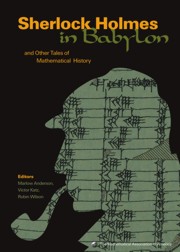Book contents
- Frontmatter
- Introduction
- Contents
- Ancient Mathematics
- Medieval and Renaissance Mathematics
- The Seventeenth Century
- The Eighteenth Century
- Foreword
- Brook Taylor and the Mathematical Theory of Linear Perspective
- Was Newton's Calculus a Dead End? The Continental Influence of Maclaurin's Treatise of Fluxions
- Discussion of Fluxions: from Berkeley to Woodhouse
- The Bernoullis and the Harmonic Series
- Leonhard Euler 1707–1783
- The Number e
- Euler's Vision of a General Partial Differential Calculus for a Generalized Kind of Function
- Euler and the Fundamental Theorem of Algebra
- Euler and Differentials
- Euler and Quadratic Reciprocity
- Afterword
- Index
- About the Editors
Afterword
from The Eighteenth Century
- Frontmatter
- Introduction
- Contents
- Ancient Mathematics
- Medieval and Renaissance Mathematics
- The Seventeenth Century
- The Eighteenth Century
- Foreword
- Brook Taylor and the Mathematical Theory of Linear Perspective
- Was Newton's Calculus a Dead End? The Continental Influence of Maclaurin's Treatise of Fluxions
- Discussion of Fluxions: from Berkeley to Woodhouse
- The Bernoullis and the Harmonic Series
- Leonhard Euler 1707–1783
- The Number e
- Euler's Vision of a General Partial Differential Calculus for a Generalized Kind of Function
- Euler and the Fundamental Theorem of Algebra
- Euler and Differentials
- Euler and Quadratic Reciprocity
- Afterword
- Index
- About the Editors
Summary
For more information on Maclaurin, the reader can consult H. W. Turnbull, Bicentenary of the Death of Colin Maclaurin [10], which contains numerous articles about aspects of his work.
Florian Cajori expanded his arguments in the article in this section into a book, A History of the Conceptions of Limits and Fluxions in Great Britain from Newton to Woodhouse [3]. A more recent treatment of much of the same material is Niccolò Guicciardini's The Development of Newtonian Calculus in Britain, 1700–1800 [8], and a good survey article on calculus in the first half of the eighteenth century is by H. J. M. Bos [1].
But the eighteenth century is the century of Euler. So to learn more about the mathematics of that century, it is essential to study the works of the Swiss genius. One good way to begin is with William Dunham's marvelous little book: Euler: The Master of Us All [4], which gives details of a number of Euler's mathematical gems. One can also read Euler's Introduction to Analysis of the Infinite [6], in an English translation by John Blanton. Although there is not yet a full-scale scientific biography of Euler, one good sketch of a biography is by Clifford Truesdell in the English translation of Euler's Elements of Algebra [9].
There are also histories of specific topics considered by Euler. For example, the history of analysis is well treated in Umberto Bottazzini, The Higher Calculus: A History of Real and Complex Analysis from Euler to Weierstrass [2] and Ivor Grattan-Guinness, The Development of the Foundations of Mathematical Analysis from Euler to Riemann [7].
- Type
- Chapter
- Information
- Sherlock Holmes in BabylonAnd Other Tales of Mathematical History, pp. 383 - 384Publisher: Mathematical Association of AmericaPrint publication year: 2003



